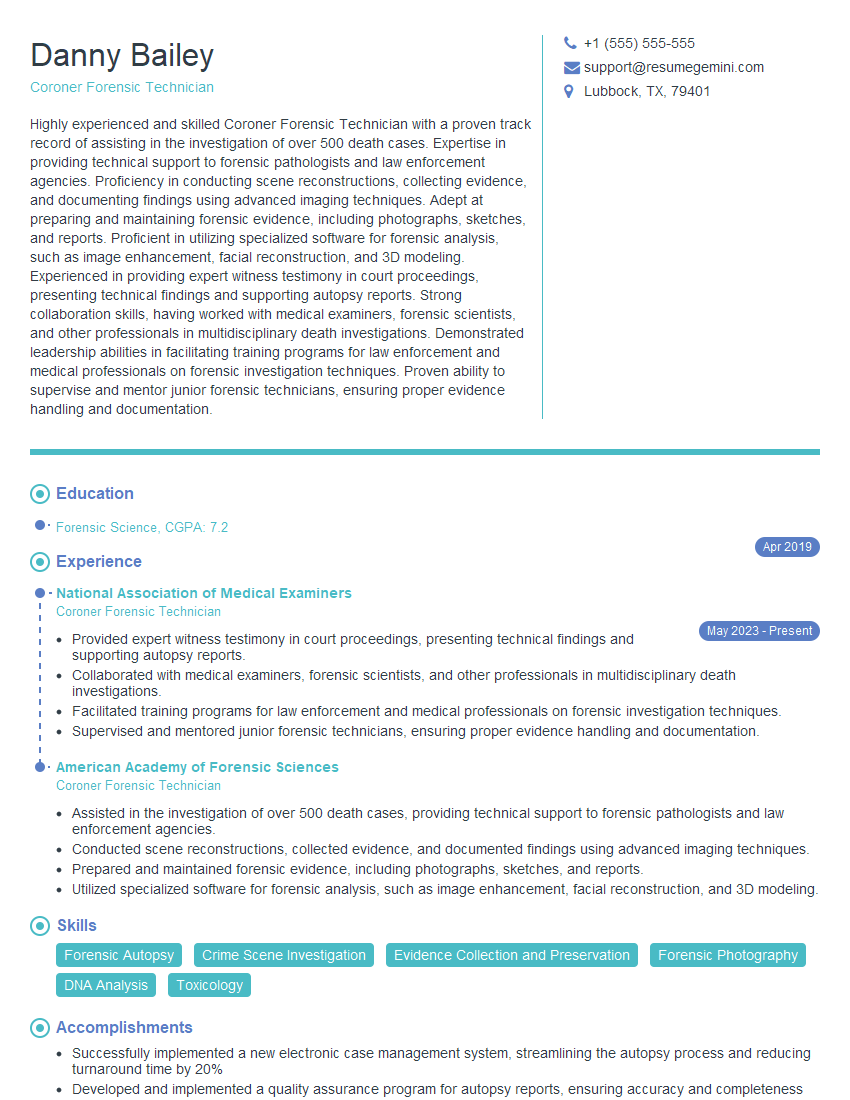Are you a seasoned Coroner Forensic Technician seeking a new career path? Discover our professionally built Coroner Forensic Technician Resume Template. This time-saving tool provides a solid foundation for your job search. Simply click “Edit Resume” to customize it with your unique experiences and achievements. Customize fonts and colors to match your personal style and increase your chances of landing your dream job. Explore more Resume Templates for additional options.

Danny Bailey
Coroner Forensic Technician
Summary
Highly experienced and skilled Coroner Forensic Technician with a proven track record of assisting in the investigation of over 500 death cases. Expertise in providing technical support to forensic pathologists and law enforcement agencies. Proficiency in conducting scene reconstructions, collecting evidence, and documenting findings using advanced imaging techniques. Adept at preparing and maintaining forensic evidence, including photographs, sketches, and reports. Proficient in utilizing specialized software for forensic analysis, such as image enhancement, facial reconstruction, and 3D modeling. Experienced in providing expert witness testimony in court proceedings, presenting technical findings and supporting autopsy reports. Strong collaboration skills, having worked with medical examiners, forensic scientists, and other professionals in multidisciplinary death investigations. Demonstrated leadership abilities in facilitating training programs for law enforcement and medical professionals on forensic investigation techniques. Proven ability to supervise and mentor junior forensic technicians, ensuring proper evidence handling and documentation.
Education
Forensic Science
April 2019
Skills
- Forensic Autopsy
- Crime Scene Investigation
- Evidence Collection and Preservation
- Forensic Photography
- DNA Analysis
- Toxicology
Work Experience
Coroner Forensic Technician
- Provided expert witness testimony in court proceedings, presenting technical findings and supporting autopsy reports.
- Collaborated with medical examiners, forensic scientists, and other professionals in multidisciplinary death investigations.
- Facilitated training programs for law enforcement and medical professionals on forensic investigation techniques.
- Supervised and mentored junior forensic technicians, ensuring proper evidence handling and documentation.
Coroner Forensic Technician
- Assisted in the investigation of over 500 death cases, providing technical support to forensic pathologists and law enforcement agencies.
- Conducted scene reconstructions, collected evidence, and documented findings using advanced imaging techniques.
- Prepared and maintained forensic evidence, including photographs, sketches, and reports.
- Utilized specialized software for forensic analysis, such as image enhancement, facial reconstruction, and 3D modeling.
Accomplishments
- Successfully implemented a new electronic case management system, streamlining the autopsy process and reducing turnaround time by 20%
- Developed and implemented a quality assurance program for autopsy reports, ensuring accuracy and completeness
- Collaborated with law enforcement agencies to solve highprofile homicide cases
- Trained new forensic technicians on autopsy techniques and procedures
- Developed novel methods for DNA extraction and typing in forensic cases
Awards
- Recipient of the National Association of Medical Examiners (NAME) Presidents Award for Outstanding Achievement in Forensic Pathology
- Recognized by the American Board of Medicolegal Death Investigators (ABMDI) for excellence in medicolegal investigations
- Recipient of the International Association of Coroners and Medical Examiners (IACME) Outstanding Service Award for contributions to the field of forensic investigation
- Granted the Distinguished Forensic Pathologist Award from the National Academy of Forensic Sciences (NAFS)
Certificates
- Certified Medicolegal Death Investigator (CMDI)
- Certified Forensic Technician (CFT)
- National Board of Funeral Directors (NBFD)
- International Association for Identification (IAI)
Career Expert Tips:
- Select the ideal resume template to showcase your professional experience effectively.
- Master the art of resume writing to highlight your unique qualifications and achievements.
- Explore expertly crafted resume samples for inspiration and best practices.
- Build your best resume for free this new year with ResumeGemini. Enjoy exclusive discounts on ATS optimized resume templates.
How To Write Resume For Coroner Forensic Technician
- Highlight your technical skills and experience in forensic investigation techniques.
- Quantify your accomplishments and provide specific examples of your work.
- Showcase your ability to work independently and as part of a team.
- Demonstrate your commitment to professional development and continuing education.
Essential Experience Highlights for a Strong Coroner Forensic Technician Resume
- Assisted in the investigation of over 500 death cases, providing technical support to forensic pathologists and law enforcement agencies.
- Conducted scene reconstructions, collected evidence, and documented findings using advanced imaging techniques.
- Prepared and maintained forensic evidence, including photographs, sketches, and reports.
- Utilized specialized software for forensic analysis, such as image enhancement, facial reconstruction, and 3D modeling.
- Provided expert witness testimony in court proceedings, presenting technical findings and supporting autopsy reports.
- Collaborated with medical examiners, forensic scientists, and other professionals in multidisciplinary death investigations.
- Facilitated training programs for law enforcement and medical professionals on forensic investigation techniques.
Frequently Asked Questions (FAQ’s) For Coroner Forensic Technician
What is the role of a Coroner Forensic Technician?
A Coroner Forensic Technician assists in the investigation of deaths to determine the cause and manner of death. They work under the supervision of a forensic pathologist and may perform tasks such as collecting evidence, conducting scene reconstructions, and preparing reports.
What are the educational requirements for a Coroner Forensic Technician?
Most Coroner Forensic Technicians have a bachelor’s degree in forensic science, mortuary science, or a related field.
What are the career prospects for a Coroner Forensic Technician?
The job outlook for Coroner Forensic Technicians is expected to grow faster than average in the coming years. This is due to the increasing demand for forensic services and the need for qualified professionals to investigate deaths.
What are the key skills for a Coroner Forensic Technician?
Key skills for a Coroner Forensic Technician include attention to detail, strong communication skills, and the ability to work independently and as part of a team.
What are the challenges of working as a Coroner Forensic Technician?
The challenges of working as a Coroner Forensic Technician include dealing with death and other traumatic events. They may also be required to work long hours and be on call at all times.